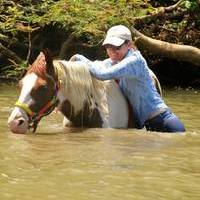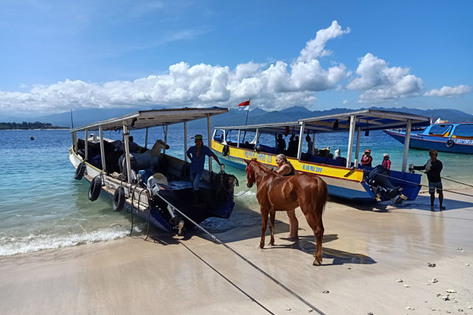
Are You & Your Horse Ready For Bitting Advice? The Steps You Need To Consider First
Equestrian Advice & Guides All Disciplines
Build your business profile for FREE and expose your services to thousands of potential clients!
Create my profile now!
It was always going to be luck of the draw, where I ended up getting stuck when the world shut down… I was in Singapore when I started thinking I would get stuck, went to Bali, where the wheels did start to come off. And so, I got to Gili Trawangan to wait it out for a week or two, but I think I’m here for a bit of a long haul. Gili T may be familiar to people who follow me – it’s where the charity Horses of Gili is – and I thought I’d give a little bit more insight into how it’s affecting these islands.
For those who don’t know… Indonesia, in South East Asia, is actually made up of 17,508 separate islands, ranging from Sumatra and Java (where the capital city, Jakarta, is) to Simping Island, which is 0.5 hectares. It’s the world’s largest archipelago, and the fourth most populous country, with around 264 million people. Some of these islands are Lombok and the three Gili’s, (Gili meaning small island) Gili Trawangan, Gili Meno and Gili Air. And the thing about these three little islands is that there are no cars, trucks or motorbikes, so everything and everyone moves about the islands on foot, bicycle or horse cart.

The Gili Islands as seen from above
The islands are not really designed to be inhabited. The difference between a rock and an island is classified as...
“Rock: A land mass permanently above water but unable to sustain human habitation or economic life on its own... Island: A land mass permanently above water that can sustain human habitation or economic life on its own.”
Gili Air (Air means water in Indonesian) is the only one of the three that has natural water, the other two, Trawangan and Meno have no fresh water, meaning that they cannot sustain human or animal life naturally.
It was in the 1990’s that scuba divers began to come to the island because of the amazing under water life. Over the past 20 to 30 years, they have become hugely popular with divers, yogi’s and party goers flocking to all three, escaping the hustle and bustle of Bali. The islands now employ a vast number of people, such as hotel workers, restaurant staff, chefs, spa employees, shop keepers, rubbish collectors, builders etc etc etc. But where does all the income come from? Tourism. Without the (mainly) Australian, Chinese and European dollar, there is nothing.

Gili Trawangan beach
Over the years, there have been issues with the horses on the islands – claims of abuse, people fighting to keep them, people fighting to replace them with golf carts (golf carts are not viable – the roads are too rough, they’ll rust and break, and they’ll tax the already overloaded electricity supply system). Horses of Gili and the Gili Eco Trust have been doing a huge amount of work, now backed by Animal Aid Abroad, and welfare conditions and concerns are improving dramatically.
The horses are mainly bred on Lombok, Sumba and Sumbawa. Part of the welfare issue is that some people claim that they cruelly capture the wild, free ranging herds there – there are no wild horses on any of these islands, just big grassy areas where owned horses graze, similar to the New Forest or Moors of UK. Mostly, the mares and foals are left there, and the colts are brought to work. Gelding is not common here on the islands, partly due to a lack of good veterinary care, partly due to the patriarchal thinking that is still very much here – it’s simply un-manly to castrate your stallion (or cat, which is why there is a cat problem). In fairness, most of the stallions are pretty level-headed and get on with the job.
So, a cidomo (horse cart) driver… He has his costs – he has to live, support himself and his family, and he has to feed his horses. And now, with an almost total world lockdown and no tourism – guess what? He has no income. People in developed countries may be panicking about being down to their last £1,000, or how to pay their mortgage, but they have a government who will step up and help, as well as free healthcare in some cases. Here? They live hand to mouth at the best of times, own little and have to pay for healthcare. And now, there is no income. They have no savings. What to do?

Cidomo driver in Indonesia
From a horse perspective, the first and most important thing as far as we were concerned, was getting the horses off the Gili islands and back to Lombok. Because there is no natural water, all of the drinking water has to come through the desalination plant meaning that 1, it has to be paid for, and 2, it has to be moved from a fresh water tap somewhere on the island. All of that costs money and time. Added to this – there is no feed here. All the rice bran and pellets have to come from Lombok, and even the grass is grown on Lombok, cut, bagged and shipped to the islands, again costing money and time. If you aren’t earning, you can’t buy feed. Added to this – the stallions live in, some quiet ones are allowed out on tether to graze, but there is no free time in paddocks. So, if they aren’t working, they are stuck in their pens 24 hours a day. All in all, it’s a much better option for the horses to return to Lombok until work picks up – clean water, paddocks, grass and feed without transport costs.

Lombok (the mainland), as viewed from the islands
With that in mind, the drivers were persuaded that it was time for the bulk of the 250 horses to go home. Now, you’re on a tiny island and the horses have to go to another island – how do you do that? There are no car ferries, no nice bridges or easy ways. Too much current to swim. That’s right, they jump into a boat, sail across and jump off at the other end.

Horses waiting to be led down the beach and loaded onto boats
Now, most of the horses do this without giving it much thought or trouble. Even the foals who haven’t done it before are pretty good about following their friends. Sometimes a horse will be scared and refuse, but part of the reason these horses are so amazing is their trainability and acceptance – they want to do what is asked and if they can see their way and understand, they do try. One boat motor is pulled out of the way, the boat is dragged onto the tide line and the horses, well, they just jump.
Horses being loaded onto a boat with other livestock
Think about loading onto your trailer, as a jump, not a ramp, now make it a moving target, jumping onto a wet deck and not slipping, loading into a boat with other stallions who you don’t know. It’s that acceptance and calmness that make these small, tough, sure-footed, primitive type ponies so valuable here.
Horses being loaded onto a boat with other livestock

Boat full of horses ready to set off for the mainland
And now, what becomes of the Gili islands and their humans and ponies? Who knows. They have no income. Will they survive? We hope so, but they will need help. We westerners have so many more options – some people have some savings; some have options of training for a new career or finding work once this is over. But for these people who survive purely on tourism, life is very scary indeed…

Boat full of horses leaving for Lombok

